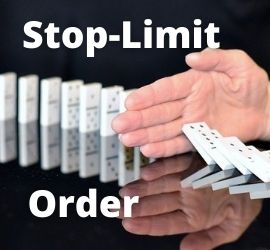What Determines Stock Price?
 What determines stock price? Every time a stock is sold, the exchange records the price at which it changes hands. If a few seconds or minutes later another trade takes place, the price at which that trade is made becomes the new market price, and so on. Organized exchanges like the New York Stock Exchange will occasionally suspend trading in a stock if the price is excessively volatile, if there is a severe mismatch between supply and demand (many people wanting to sell, no one wanting to buy) or if they suspect that insiders are deliberately manipulating a stock’s price. But in normal circumstances, there is no official arbiter of stock prices, no person or institution that “decides” a price. The market price of a stock is simply the price at which a willing buyer and seller agree to trade.
What determines stock price? Every time a stock is sold, the exchange records the price at which it changes hands. If a few seconds or minutes later another trade takes place, the price at which that trade is made becomes the new market price, and so on. Organized exchanges like the New York Stock Exchange will occasionally suspend trading in a stock if the price is excessively volatile, if there is a severe mismatch between supply and demand (many people wanting to sell, no one wanting to buy) or if they suspect that insiders are deliberately manipulating a stock’s price. But in normal circumstances, there is no official arbiter of stock prices, no person or institution that “decides” a price. The market price of a stock is simply the price at which a willing buyer and seller agree to trade.
Why then do prices fluctuate so much? The vast bulk of stock trades are made by professional traders who buy and sell shares all day long. Daytraders hope to profit from small changes in share prices. Since these traders do not hold stocks over the long haul, they are not terribly interested in such long-term considerations as a company’s profitability or the value of its assets. Or rather, they are interested in such factors mostly insofar as news that would affect a company’s long-term prospects might cause other traders to buy the stock, causing its price to rise. If a trader believes that others will buy shares (in the expectation that prices will rise), then she will buy as well, hoping to sell when the price rises. If others believe the same thing, then the wave of buying pressure will, in fact, cause the price to rise.
(Source: dollarsandsense.org)
Supply and Demand
Generally speaking, the prices in the stock market are driven by supply and demand. This makes the stock market similar to other economic markets. When a stock is sold, a buyer and seller exchange money for share ownership. The price for which the stock is purchased becomes the new market price. When a second share is sold, this price becomes the newest market price, etc.
What Determines Stock Price Assumptions?
The price of a stock heavily relies on the opinion about that stock’s worth from the investor’s perspective. So, what determines stock price assumptions?
- Earnings – Arguably the most important part of a company that investors focus on, are the earnings of the company. Increasing earnings within a business usually drive up stock prices over the long term since it makes up a strong sign to investors about the rising value and future positive outlook of the company. Many Investors use a common metric called the price-to-earnings ratio to gauge a stock’s price in relation to the underlying earnings of the company.
- Economic activity – Pretty much everything ranging from problems within the business to certain economic activities can influence the current view of investors about the company. For instance, a company that is currently operating within a dying industry would signalize many investors that the business is not likely to have a bright future outlook, leading shareholders to sell their stock and thus lead to a decrease in the stock price.
- Expectation – Sometimes, stock prices will still be high, despite the current financials of the underlying business. Oftentimes, this indicates that investors are willing to overpay for a business, as they believe that the business is about to grow substantially in the future, whereas companies that aren’t likely to grow rapidly will mostly trade at lower price multiples.
The results that follow expectations of future earnings can also lead to heavy stock price movements. Companies usually report their recent earnings on a quarterly basis. If the announced earnings don’t meet the expectations of investors, the company’s stock price usually suffers from that. On the other hand, companies can exceed investor’s expectations with higher earnings than expected. This causes the stock price to increase.
(Source: cliffcore.com)
Are Stock Prices Predictable?
In general, the shorter the time frame, the more difficult it becomes to predict stock price movements. Trying to predict if a stock is going up or down within short time frames is considered as speculating and not real investing. As a day trader, for example, you are rather challenging your luck by mostly relying on pure randomness, instead of common and logical sense. The odds for you to make consistent profits in the long term by speculating are low, as even the best stock experts can’t predict how the future is going to look like. Because nobody can. Stock price movements are simply not fully predictable because they essentially reflect human behavior and decisions, which are also extremely difficult to predict, especially in the short term since we can not completely act with rational sense on every decision we make. (Source: ibid)
There are quantitative techniques and formulas that can be used to help predict the price of a company’s shares. Called dividend discount models (DDMs), they are based on the concept that a stock’s current price equals the sum total of all its future dividend payments (when discounted back to their present value). By determining a company’s share by the sum total of its expected future dividends, dividend discount models use the theory of the time value of money (TVM). (Source: investopedia.com)
What Determines Stock Price and Market Capitalization?
What determines stock price and market capitalization? A company’s worth—or its total market value—is called it’s market capitalization, or “market cap.” A company’s market cap can be determined by multiplying the company’s stock price by the number of shares outstanding. The stock price is a relative and proportional value of a company’s worth. Therefore, it only represents a percentage change in a company’s market cap at any given point in time. Any percentage of change in a stock price will result in an equal percentage change in a company’s market cap. This is one of the main reasons why investors are so concerned with stock prices; for example, a $0.10 drop in the stock price can result in a $100,000 loss for a shareholder with one million shares.
A company’s market capitalization is a measure of what a company’s market value is. Market cap is calculated by taking the current share price and multiplying it by the number of shares outstanding. For example, a company with 50 million shares and a stock price of $100 per share would have a market cap of $5 billion. Stocks are often classified according to the company’s respective market value; “big-caps” refer to company’s that has a large market value while “small-caps” refer to a company that has a small market value.
(Source: ibid)
Market Capitalization = share price x number of shares outstanding
A company’s market cap is first established in an event called an initial public offering (IPO). During this process, a company pays a third party, typically an investment bank. They use very complex formulas and valuation techniques to derive a company’s value. They also determine how many shares will be offered to the public and at what price. For example, a company whose value is estimated at $100 million may want to issue 10 million shares at $10 per share. After a company goes public, and its shares start trading on a stock exchange, its share price is determined by supply and demand for its shares in the market. If there is a high demand for its shares due to favorable factors, the price will increase. If the company’s future growth potential doesn’t look good, sellers of the stock can drive down its price.
For example, suppose that Microsoft (MSFT) is trading for $71.41 on a particular day, and has 7.7 billion shares outstanding. Assume also that the company is valued at $71.41 x 7.7 billion = $550 billion. If we take this one step further, we can see that Facebook (FB), which has a $167.40 stock price and 2.37 billion shares outstanding (market cap = $396.7 billion) is worth less than a company with a $71.41 stock price and 7.7 billion shares outstanding (market cap = $550 billion).
(Source: investopedia.com)
Misconceptions About Market Capitalization
Large-cap and small-cap are terms often used to describe a company. However, the market cap does not measure the equity value of a company. Only a thorough analysis of a company’s fundamentals can do that. Market capitalization is not an adequate way to value a company. This is because the basis of its market price does not necessarily reflect how much a piece of the business is worth. Shares are often over-or undervalued by the market. The market price determines only how much the market is willing to pay for its shares. It is not an accurate measure of how much it is actually worth.
Market capitalization measures the cost of buying all of a company’s shares. It does not determine the amount the company would cost to acquire in a merger transaction. While a market cap is often used synonymously with a company’s market value, it is important to keep in mind that a market cap refers only to the market value of a company’s equity, not it’s market value overall which can include the value of its debt or assets.
(Source: ibid)
What Determines Stock Price – Final Words
So, what determines stock price? The fundamental factor that determines stock price is the law of supply and demand. If more and more investors are willing to buy a stock, the demand for that stock rises and thus its share price. The demand for a stock is heavily based on the underlying fundamentals of the company and its future prospects. In general, investors are willing to pay a higher premium for companies that are expected to grow at a faster paste than other businesses. Furthermore, the price of a stock will also depend on the share count within a business. Companies that have a lower number of shares will have a more expensive stock than other companies that might even have similar market capitalization.
Up Next: Day Trading For Beginners – What Is A Day Trader
Day trading can be summarized simply as buying security. Then, quickly selling or closing out the position within a single trading day. Ideally, a day trader wants to “cash-out” by the end of each day with no open positions to avoid the risk of losses by holding security overnight. Day trading is not for everyone and carries significant risks. It requires an in-depth understanding of how the markets work and various strategies for profiting in the short term. Short term profits require a very different approach compared to traditional long term, buy and hold investment strategies.




